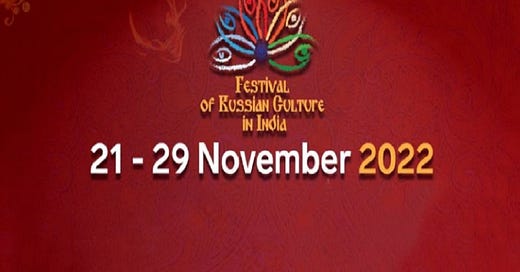The Russian Culture Festival In India Will Strengthen People-To-People Ties
Moscow had no way of knowing decades ago that the emotional element of the Russian-Indian Strategic Partnership would later end up literally saving it and subsequently revolutionizing International Relations during its most comprehensively vulnerable moment since World War II. The lesson to be learned is that soft power could indeed be a geostrategic game-changer and thus mustn’t be neglected.
Russian Ambassador to India Denis Alipov announced the opening of the week-long festival celebrating his country’s culture, which will surely strengthen people-to-people ties between these decades-long special and privileged strategic partners. He even referenced a popular Hindi saying about how “there is nothing more important than friendship”, which he described as “a very precise characteristic of the trusted and friendly character of Russia and India's strategic partnership.”
This isn’t hyperbole either since a recent survey from the prestigious Observer Research Foundation found that Indian youth regard Russia as their country’s most reliable partner, and more believed that it’s “very likely” that it’ll remain so across the coming years than they think the same about the US. Furthermore, the trusted and friendly character of these Great Powers’ strategic partnership was recently espoused by none other than President Putin, who praised the Indian people earlier this month.
This followed his equally high and sincere praise of Prime Minister Modi for his bravery in practicing a truly independent foreign policy in the face of unprecedented Western pressure. The emotional element of the Russian-Indian Strategic Partnership ensures that it’ll forever remain enduring and thus continue reshaping International Relations. About that, they’re jointly pioneering a third pole of influence in the present bi-multipolar intermediary phase of the global systemic transition to multipolarity.
The strategic consequences of this development have truly been game-changing with respect to creating the conditions for accelerating that aforesaid transition’s evolution towards tripolarity ahead of its final form of more complex multipolarity (“multiplexity”). Intrepid readers can learn more about this here, here, here, here, and here since the details are beyond the scope of the present analysis’ focus on people-to-people ties between Russia and India.
The point in sharing the preceding insight is to show the importance of further strengthening socio-cultural relations since they’re the basis upon which their globally game-changing strategic partnership is built. Without full trust and truly equal respect between them at all levels, from their permanent bureaucracies down to average citizens, they wouldn’t be able to achieve their shared goal of accelerating the global systemic transition to multipolarity.
The unprecedented Western pressure that was previously placed upon India prior to the White House Press Secretary tacitly recognizing the failure of this policy and instead praising that country for its principled neutrality could have prompted grassroots pressure too had Indians not truly loved Russia. After all, their leadership’s refusal to comply with America’s demands to distance their country from its strategic partner would have been extremely unpopular in that scenario.
Be that as it could have been, it was because Indians truly love Russia due to the emotional element of their strategic partnership that their leadership’s policy was actually wildly popular, thus leading to genuinely grassroots support for continuing to resist American pressure. This represented an example whereby foreign policy was perfectly aligned with domestic sentiment, which is rare anywhere in the world, whether in the US-led West’s Golden Billion or the jointly BRICS- & SCO-led Global South.
Had Russia not enjoyed the goodwill and support of the Indian people, then the latter’s leadership might have ultimately not decided to serve as their strategic partner’s irreplaceable valve from Western pressure for preemptively averting the scenario of potentially disproportionate dependence on China. It was that move that completely altered the trajectory of the New Cold War by breaking through the global systemic transition’s hitherto bi-multipolar impasse and thus making multiplexity possible.
This observation goes to show the long-term geostrategic significance of properly investing in soft power. Moscow had no way of knowing decades ago that the emotional element of the Russian-Indian Strategic Partnership would later end up literally saving it and subsequently revolutionizing International Relations during its most comprehensively vulnerable moment since World War II. The lesson to be learned is that soft power could indeed be a geostrategic game-changer and thus mustn’t be neglected.




